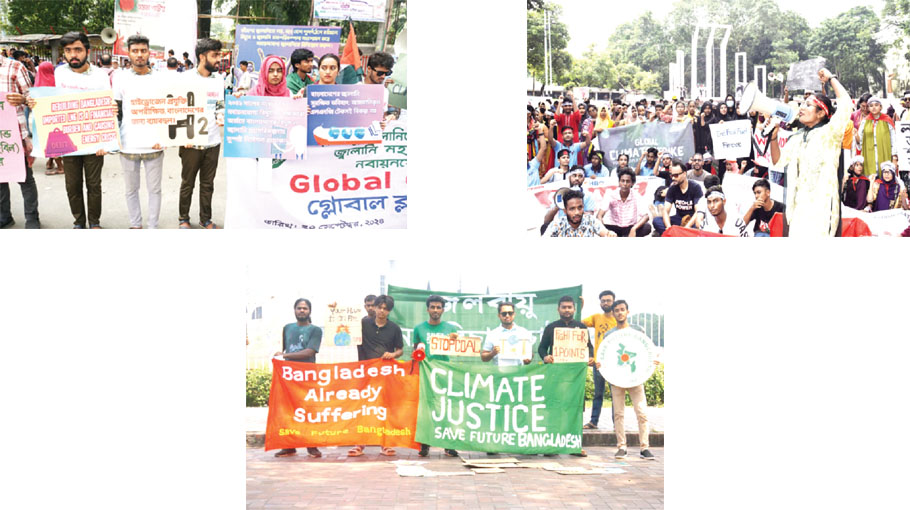Global Climate Strike 2024
Bangladeshi youths demand climate finance for loss and damage fund


As part of the Global Climate Strike, the Bangladeshi young climate activists on Friday (September 20) staged demonstrations in the capital and other parts of the country, aligning with millions worldwide demanding action on climate issues
The young activists from separate gatherings demanded that world leaders halt harmful and costly fossil fuel financing and allocate climate funds to address loss and damage, ensuring a sustainable future.
ActionAid Bangladesh, YouthNet for Climate Justice, the Asian Peoples’ Movement on Debt and Development (APMDD) and the Asia Energy Network (AEN), Save Future Bangladesh and some other platforms staged demonstrations in Bangladesh.
Activista Bangladesh, youth platform of ActionAid Bangladesh, staged demonstration where over five hundred young climate activists joined the programme. They gathered on the premises of Shaheed Minar after starting the rally at the National Press Club. The protest ended with a call for climate justice.
The climate protesters stated that developed countries are fueling the climate crisis through fossil fuel financing. Their neo-colonial exploitation, war, and human rights abuses are destroying the planet.
Activista volunteers from 19 different districts and seven localised youth hubs also protested in solidarity with the climate activists across the country by participating in local demonstration in Kushtia, Jamalpur, Netrakona, Mymensingh, Gazipur, Noakhali, Sunamganj, Chandpur, Khulna, Satkhira, Bagerhat, Barguna, Kurigram, Teknaf, Rangpur, Chattogram, Cox’s Bazar, and many other places.
The young activists demanded climate justice through slogans, placards, figures, songs, plays, posters and street dramas demanding #FundOurFuture #EndFossilFuelFinance #PayUp for #ClimateFinance, #PayUp4LossAndDamage ‘FixTheFinance’, ‘End Fossil Finance Now’, ‘Invest in Renewables’, ‘Stop Financing Harmful Agribusiness’, ‘Climate Justice Now’, ‘Invest in Agroecology’ and many more.
Young climate activist Shimu Sheikh said, “Today, we are fighting to bring an end to the fossil finance and focusing more on loss and damage financing. We are being hurt by the profit-hungry mentality of the wealthy countries and corporations. Our future cannot be sacrificed for profit for few greedy cartels.”
Md. Nazmul Ahsan, Lead-Young People, ActionAid Bangladesh said, “We demand investment to address vulnerability and loss & damage to the most climate-stressed people in Bangladesh and across the globe.”
YouthNet for Climate Justice arranged its climate strike programme in front the National Press Club in Dhaka. The primary focus the programme is calling for the urgent revision of Bangladesh’s Integrated Energy and Power Master Plan (IEPMP).
The demonstrators emphasised that the current IEPMP does not align with the country’s climate goals, urging the government to prioritise renewable energy and sustainable development. They believe that revising the plan is essential to ensure Bangladesh’s energy policies address the growing environmental crises effectively, while avoiding further dependency on fossil fuels.
The young climate activists criticized the current IEPMP for its focus on unproven and costly technologies, arguing that such an approach could harm the economy and stifle the growth of renewable energy. They emphasised that the plan does not align with broader climate goals and national climate strategies. Slogans and placards at the rally underscored the urgency of realigning energy policies to tackle the climate crisis and accelerate the transition to clean energy.
Sohanur Rahman, Executive Coordinator of YouthNet for Climate Justice, emphasized the critical nature of their demands: “We are at a pivotal moment. It’s time to overhaul our energy policies and fully commit to a just transition to renewable energy. Bangladesh’s youth demand immediate action to ensure a climate-resilient future. Our leaders must act decisively before it’s too late.”
Dr. Khondaker Golam Moazzem, Research Director at the Centre for Policy Dialogue (CPD), supported the youth’s demands: “Bangladesh’s new political leadership aspires to achieve net-zero carbon emissions by 2050. To meet this target, we need to overhaul the IEPMP, which currently reinforces carbon lock-in and delays the renewable energy transition. Immediate revision is crucial for aligning with national climate goals and achieving a sustainable future.”
M. Zakir Hossain Khan, Chief Executive of Change Initiative, addressed the need for effective climate finance: “Climate finance should not only address immediate vulnerabilities but also catalyze long-term resilience and nature conservation. In Bangladesh, investing in renewable energy is crucial for building cost-effective resilience. We must focus on direct, grant-based climate finance to support solar, wind, and other renewables, ensuring accessibility and sustainability.”
The Asian Peoples’ Movement on Debt and Development (APMDD) and the Asia Energy Network (AEN) jointly organised their programme across Asia. In Bangladesh, Dhoritri Rokkhay Amra--Dhora (We for Protecting Earth), Waterkeepers Bangladesh and BD Tourist Cyclists along with local other organisations arranged climate strike programmes. They jointly arranged a rally in front of the National Museum at Shahbagh,
Adviser (private) of Bangladesh Competition Commission MS Siddiqui was present as the chief guest with Ibnul Sayed Rana in the chair.
Sharif Jamil, member secretary of Dhora and coordinator of Waterkeepers Bangladesh, said that saising climate finance targets for the Global South will be discussed at the upcoming COP-29 summit in November, which will be high on the agenda. It is expected that COP-29 will set a new collective quantified goal (NCQG) for climate finance, replacing the previous target of $100 billion. This earlier goal has been criticized as insufficient. As a coastal vulnerable country, we demand immediate funding from the Climate Fund to address our damage and adaption activities.
‘Save Future Bangladesh’ arranged rally in front of Parliament Building in the capital. Nayon Sorkar, chief coordinator of ‘Save Future Bangladesh’ said, now every place in Bangladesh is a village affected by climate change and environmental disasters. Meanwhile, frequent cyclones in coastal areas of Bangladesh; Being affected by sea level rise, river erosion and salinity.
“While the developed world lives a life of luxury, we are faced with calamities. Where is the climate finance? We want climate justice and climate compensation,” said Nayon Sorkar.



